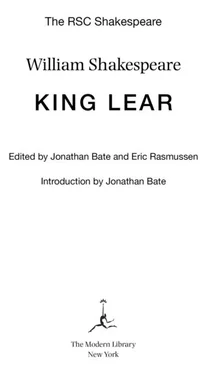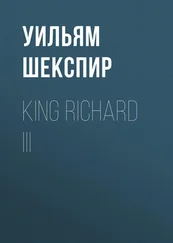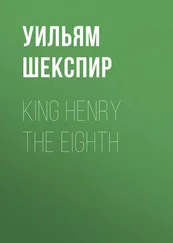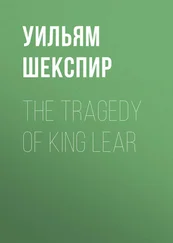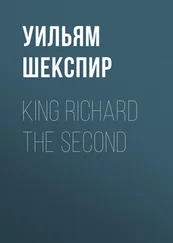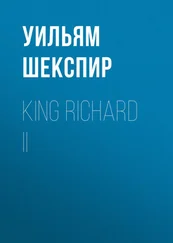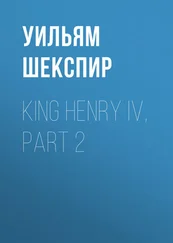уильям шекспир - King Lear
Здесь есть возможность читать онлайн «уильям шекспир - King Lear» весь текст электронной книги совершенно бесплатно (целиком полную версию без сокращений). В некоторых случаях можно слушать аудио, скачать через торрент в формате fb2 и присутствует краткое содержание. Год выпуска: 2011, ISBN: 2011, Издательство: Random House Publishing Group, Жанр: Старинная литература, на английском языке. Описание произведения, (предисловие) а так же отзывы посетителей доступны на портале библиотеки ЛибКат.
- Название:King Lear
- Автор:
- Издательство:Random House Publishing Group
- Жанр:
- Год:2011
- ISBN:978-1-58836-828-7
- Рейтинг книги:3 / 5. Голосов: 1
-
Избранное:Добавить в избранное
- Отзывы:
-
Ваша оценка:
- 60
- 1
- 2
- 3
- 4
- 5
King Lear: краткое содержание, описание и аннотация
Предлагаем к чтению аннотацию, описание, краткое содержание или предисловие (зависит от того, что написал сам автор книги «King Lear»). Если вы не нашли необходимую информацию о книге — напишите в комментариях, мы постараемся отыскать её.
King Lear — читать онлайн бесплатно полную книгу (весь текст) целиком
Ниже представлен текст книги, разбитый по страницам. Система сохранения места последней прочитанной страницы, позволяет с удобством читать онлайн бесплатно книгу «King Lear», без необходимости каждый раз заново искать на чём Вы остановились. Поставьте закладку, и сможете в любой момент перейти на страницу, на которой закончили чтение.
Интервал:
Закладка:
Warner:You need all your energy and all your fight to play Lear, just as an opera singer needs theirs for Tristan, Wotan, or Siegfried. You cannot leave it too late. Brian Cox was forty-four when he played it for me. The first scene demands that the actor hit raw and engulfing fury within minutes. Throughout the opening scenes this anger is further released until it lets fly and the play climbs from there. You have to risk exhaustion to play it well. This play is not gentle on its lead actor, but where Shakespeare is brilliant and kind is in letting the evening be shared and there is, of course, the famous break at the start of the second half for a rest in the dressing room. Shakespeare always acts as helpful assistant to the director and he supports the actors by graphing and arcing their evening. Actors must follow him for their physical well-being, but they must follow what he asks for too. Real anger, real madness … or, no play.
How did your production deal with the part of the Fool and his disappearance halfway through the action?
Noble:In the first production in 1982 with Michael Gambon and Tony Sher it became quite famous. We did an improvisation in rehearsal, and I said just hold that a fraction longer, and the net result was that King Lear accidentally stabbed the Fool, and he died. I had teachers coming in to say “You have to write in your program that that is not what Shakespeare wrote!” Because it is completely logical. Just before this, there’s: “The little dogs and all, Trey, Blanch and Sweetheart, see, they bark at me” and there’s “lie here and rest awhile”; “draw the curtains.” And so we had the Fool using a cushion and Lear chasing him, and in stabbing the cushion he accidentally stabs the Fool. And then the little feathers became dogs. It was very beautiful and completely logical.

8. “The oldest hath borne most”: Robert Stephens (right) as Lear and David Bradley as Gloucester, finding a human bond in their anguish, in Adrian Noble’s 1993 production.
The Fool’s function in life is entirely tied up with the king. He’s like a soldier’s batman. There’s no logic for him to exist once the master’s dead, or mad.
Warner:My National Theatre Fool (David Bradley) died during the interval of exhaustion and cold. He went to sleep in a wheelbarrow somewhere in the dark interior of the hovel and never woke again. A sad and quiet death that went practically unnoticed. In my Kick Theatre production the actress Hilary Townley played both Cordelia and the Fool (a doubling I am sure Shakespeare intended), which solves so many issues so very easily. For example, “my poor fool is hanged” draws effortless and painful meaning from such casting.
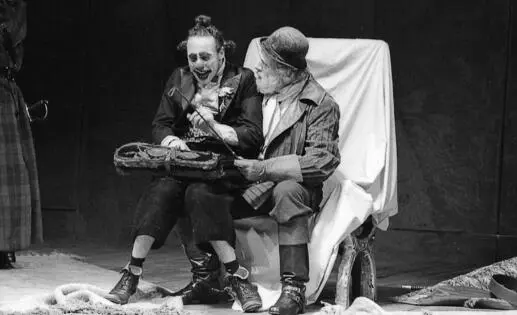
9. Michael Gambon as Lear and Antony Sher as the Fool, with mask, in Adrian Noble’s 1982 production.
One striking feature of Shakespeare’s reworking of the old anonymous Leir play is his removal of its Christian frame of reference (that was one of the reasons why Tolstoy perversely said he preferred the old play!). The characters are always appealing to the gods but not getting the response they want. And then there is Edmund appealing to “Nature” as his goddess. What was your thinking about religion in the play?
Noble:The first time I did it I quite consciously sought a godless universe. I was very influenced by Brecht and Beckett. I sought a godless universe and a quite vengeful, spiteful universe. I made heavy cuts at the end of the play to highlight that fact.
The second time I imagined a universe that was not godless, but in which the gods sat back and refused to interfere. The choice is as much to do with the director or interpreter as the writing.
Warner:The removal of any uniting Christian frame makes this text all the more available to us now. The characters are struggling away as we are all struggling away, and have ever been struggling away for centuries. From the seventeenth century to the twenty-first, Shakespeare allows us no simple answers, and that is why productions should beware of giving them.
Nunn:Remember, in the old Leir play, the king is restored to his throne and Cordelia lives. By changing the ending, Shakespeare deliberately violates a seemingly fundamental rule of drama, namely that plays serve as a moral or cautionary influence on their audience, because they show, regardless of trial and vicissitude, that the good will triumph in the end. In King Lear we’re surely expecting just that, but Shakespeare won’t allow it. I think this is proof positive that Shakespeare’s intentions were very different from those of the old play. Shakespeare’s investigation of the extremes of human behavior, into the nature of man the species, concludes that life isn’t like a morality play. When everything in our religious and cultural history requires us to believe that ultimately the gods will intervene on the side of virtue, Shakespeare says emphatically that they don’t. It’s more than the conclusion that his play is not Christian, it’s that he moves to a conclusion that is, at the very least, agnostic.
For me, it is centrally important that there is no sense of divine justice in this tragedy. I’m wondering whether any other writer during the Elizabethan age ever ventured to question whether or not the heavens might be empty? In the early scenes, as I said, Shakespeare’s play sets up the fundamental belief in his characters that human actions are overseen by the gods. Lear seems to believe that, like him, the gods are old men, that they are intelligent, and that they’re watching, and he clearly sees himself as in privileged contact with the gods. But as the play progresses, Shakespeare shows us more people praying for the intervention of the gods, to no avail. The battle at the climax of the story will determine whether or not the “good” will triumph. Gloucester is urged by Edgar to “Pray that the right may thrive.” He does. They don’t. Finally, as it’s realized that a death sentence is on both Lear and Cordelia, Albany leads all present in a final prayer as soldiers run to the prison—“The gods defend her!” The first word of the next line is “Howl.” Cordelia is dead. No intervention. The gods aren’t mentioned again.
So yes, I think Edmund is placed before us early on as evidence of a solitary, dangerous, atheistical intelligence. Then as Lear’s journey takes him increasingly toward challenging the behavior of the gods, arriving at his epiphany in the “unaccommodated man” speech, his more fundamental questions begin. “What is the cause of thunder?” “Is there any cause in nature that makes these hard hearts?” His questions now seem to be reaching toward Darwinian rather than divine explanations, and his belief in the gods begins to evaporate.
What about Edgar? He’s quite an actor, performing in different voices, isn’t he? He’s Poor Tom, but then after that, after the cliff fall, he’s the man on the beach and after that he’s the peasant with the accent who kills Oswald—why does Edgar have all these different languages and voices and play all these different roles? Why doesn’t he much sooner just say, “Look, Dad, I’m sorry. You should be sorry, you got the wrong son, I’m the good one. You’re blind, this is me …” So many opportunities in so many different roles … until he finally gets around to telling his father the truth, by which time he’s left it so late that all Gloucester can do is die of a heart attack.
Читать дальшеИнтервал:
Закладка:
Похожие книги на «King Lear»
Представляем Вашему вниманию похожие книги на «King Lear» списком для выбора. Мы отобрали схожую по названию и смыслу литературу в надежде предоставить читателям больше вариантов отыскать новые, интересные, ещё непрочитанные произведения.
Обсуждение, отзывы о книге «King Lear» и просто собственные мнения читателей. Оставьте ваши комментарии, напишите, что Вы думаете о произведении, его смысле или главных героях. Укажите что конкретно понравилось, а что нет, и почему Вы так считаете.
